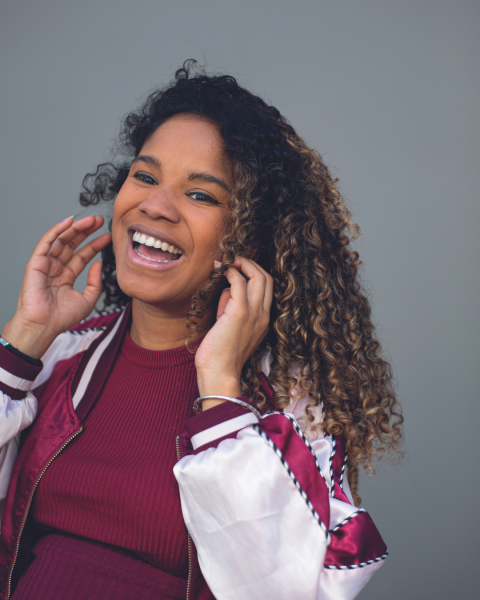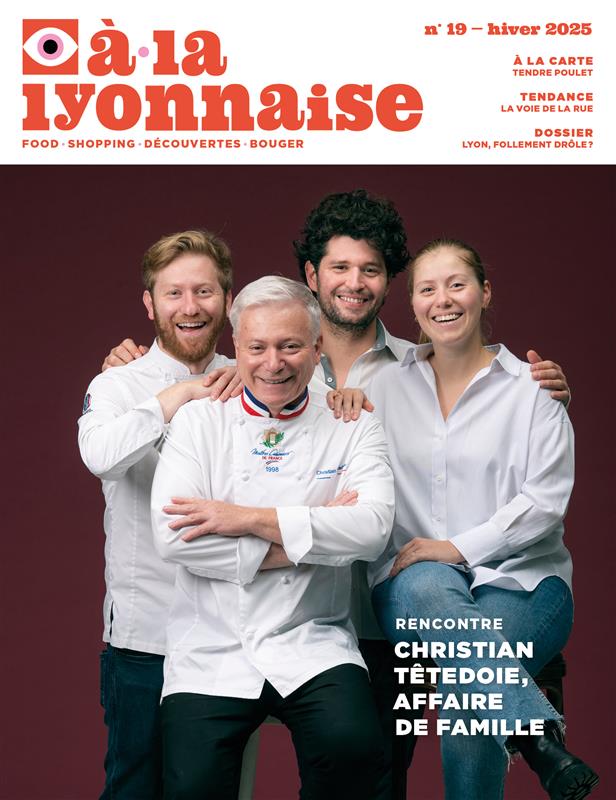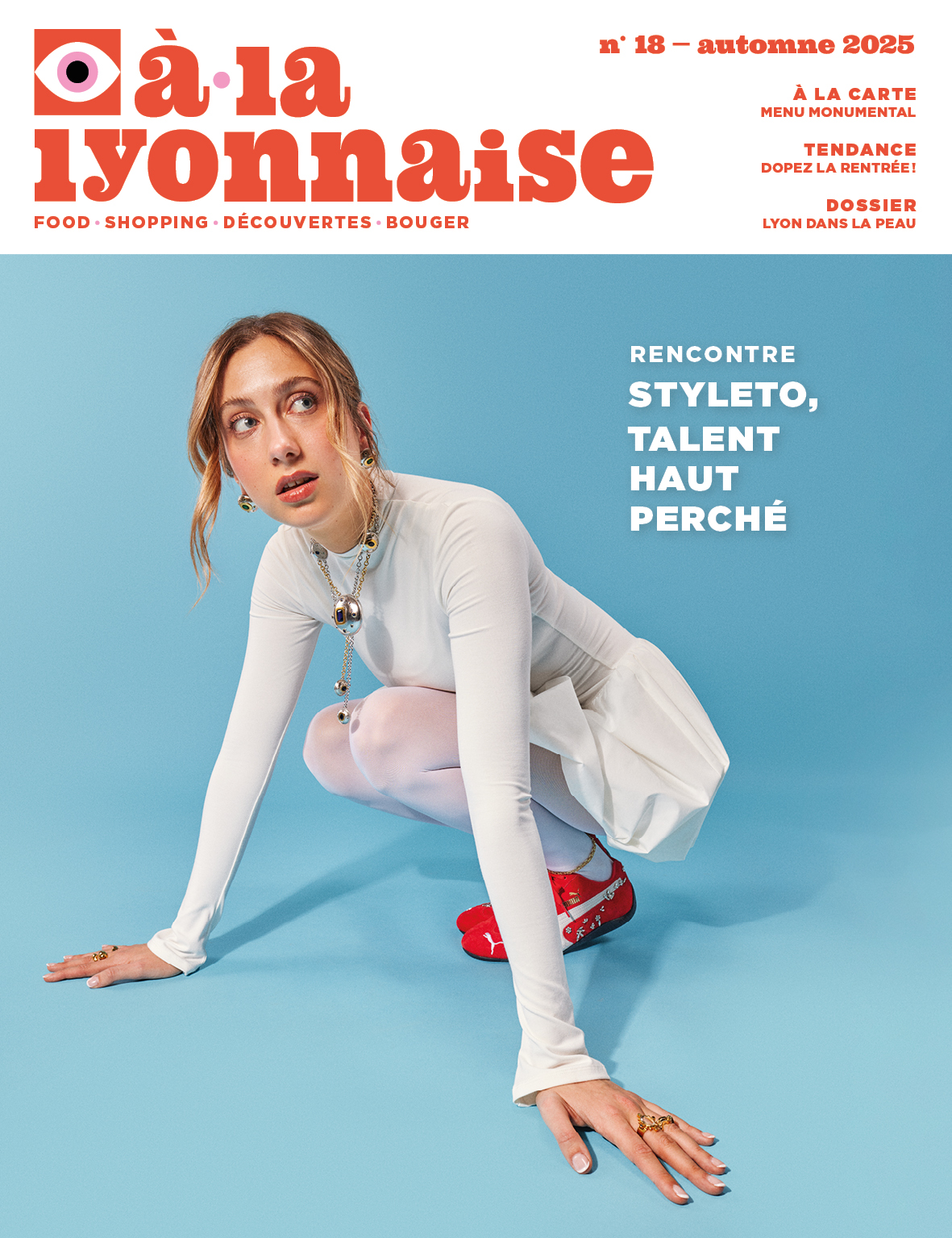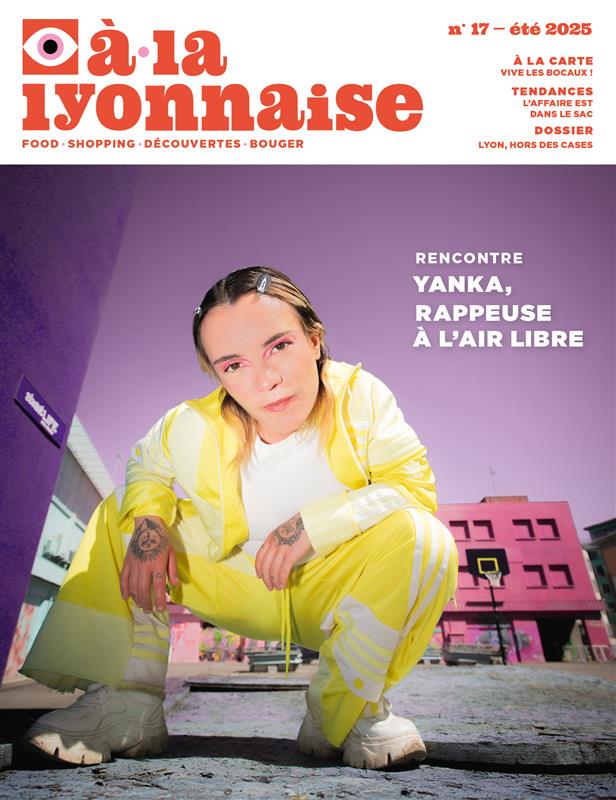Élodie Arnould : pregnancy, a user guide

Having a laugh about the challenges of pregnancy while poking fun at those who like to hand out lessons and the inheritors of patriarchy: this is the pitch of ‘Fécondée’ (impregnated), a show written over the space of a few months and performed in pop-up by the comedian Élodie Arnould, from Lyon and Clermont. The young mother and stand-up comedian will be back on stage in a few months. In the meantime, the show is available to stream all winter on France TV.
Our meeting with Élodie Arnould
A few lucky souls had a chance to see you in Lyon over the summer, for the first performances of your pop-up show: Fécondée. For the rest of us, it will be streamed by France TV. How was this project born?
In my previous show – ‘Future grande ?’ (Future grown-up?) – I sing, dance and remain standing throughout the show. When I was pregnant, I knew it would be difficult to continue performing it beyond three or four months. What’s more, it was my second pregnancy and, as my gynaecologist said, given my age (Editor’s note: 36), it was almost a geriatric pregnancy! Being idle bothered me, because it really isn’t me and I’d already started working with Briac again, an old friend from Marseille. It was his suggestion to do a show about my pregnancy, based on the sections we already had, and the book I wrote during lockdown, ‘Le Guide zéro tabou de la grossesse’ (The no-taboos guide to pregnancy), illustrated by an absolutely hilarious woman: Maman Sa Mère.
Is it very different performing while pregnant?
I’m really dynamic on stage; I use my whole body for comic effect. That’s how I see myself from the outside anyway! I couldn’t do my usual clowning around; I felt weighed down and couldn’t move around like before. I allowed myself to sit down a bit, which changes the atmosphere, but it is supposed to be the story I’m telling that’s funny after all.
You didn’t get to perform this show on stage much; did you feel any frustration?
Yes! I would really have liked to do more. First of all, to get more familiar with the show, because memorising was difficult. Also, because they sold out very quickly, I know that there were many people who wanted to see the live shows; I would have liked to be able to do it.
Fécondée won’t be performed again for sure?
It really was intended as a pop-up show concept. There are jokes that I can only do while pregnant and I don’t want to do it with a fake bump, for it to be artificial. Also, the show is being streamed for free for months by France TV, so people who want to see it have no excuses [laughs!].
You’re a qualified engineer; what brought you to the stage?
Humour is a means of communication in my family, but we weren’t particularly drawn to the theatre. Growing up in Grenoble, I was pretty studious. After graduating from secondary school, I went to the INSA engineering school in Lyon for five years, including a six-month internship in the United States, at Boston College in a science lab. After INSA, I worked in the nuclear industry at EDF in Marseille, half in the field and half in the office.
"Improv theater, the joy of being on stage and making people laugh was a revelation!"
Is that where you started improv?
It was really an outlet, because engineering is kind of a serious profession. Improv theatre, the joy of being on stage and making people laugh was a revelation! At my school, we did matches every month and we had to rotate the teams, but I always wanted to be on. The teacher encouraged me to write sketches and perform in comedy clubs.
After that you returned to Lyon...
I was looking for an improv class, because it really had me hooked and I was determined to pursue it. I started going to the nights at the Graines de Star Comedy Club in Villeurbanne. I was working in a research department at the time and feeling bored. So, I decided to go for it: I took a business creation leave, wrote my show and performed it at Le Complexe du Rire, at the Espace Gerson, and especially at Le Boui Boui, which then booked me for several months in a row. That really was a stroke of luck. Working as a comedian, you have to fight to get dates, learn the trade, create presentations to promote yourself at theatres, make an impression on programmers... In Paris, it’s even more difficult because you have to hire a venue, which means you know there is a risk you might end up losing money.
Is being in Paris a must for comedians?
I think that there are several paths that can take us where we want to go. Sellig, for example, stayed in Lyon and built his career here while gaining national attention. Having said that, for greater I visibility, to get on radio and TV, that’s where it’s all happening, which isn’t to say that you necessarily have to live there.
Do you write alone or with others?
It depends. Finding a co-author is difficult. It’s like a marriage; you need to find someone that you really click with. When you have a co-author who you can throw ideas at and they bounce something right back, then you know you’re onto something good. For Fécondée, it was really 50-50 with Briac. I wouldn’t have managed it without him. I’d come up with an idea, he’d throw one back to me, I’d throw one back to him, and we ended up finishing the show in three months.
You’re very active on social networks; is it a way of reaching more people?
As a comedian, you can get by without a producer, but not without social networks. It’s part of the job, even though creating sketches for the stage and video shorts for Instagram are two very different things. With a sketch, after you write it, working on each word and each pause really matters. It’s all about the details. Videos are more spontaneous; I just take
a few notes to remember the joke and then film it. I can then keep bits or cut them out when editing. Some things work well on Instagram, but not at all at the comedy club; they are different ways of consuming humour. On social networks, if you touch on an interesting point, people will think “ah, that’s clever”. For stage, on the other hand, you’re looking for something more organic, something that will surprise. It’s not the same process and it’s harder to get laughs in a live performance than a LOL or ROFL emoji.
Before Clermont-Ferrand, you lived in Lyon; what was it like living here?
Lyon was really my student years. My mum and sister also live here, so I often come back. My mum lived in Monplaisir for a long time, near Place Ambroise-Courtois. There was always something happening there. Once a year, there would be food trucks and tables laid out; in winter, they’d set up an ice rink; in summer, there was an outdoor cinema. I loved it. I also lived in Charpennes, but it was too rough for me!
"For a comedian, Lyon is a good place to test yourself"
Is there a “Lyonnais school” of comedy?
Some pretty amazing comedians in France have come through Lyon. I have a lot of admiration for Florence Foresti, for example. She inspired a lot of women. Lyon is a good place to test yourself. Stand-up has seen amazing growth here with people like Kacem de La Fontaine and Hermann Meva, who were among the first stand-up comedians to create comedy clubs. I follow an Instagram account that lists them all: Cocorico Lyon.
Is the world of comedy like a big family?
It’s like at school. You know everybody, some more than others, and groups form. In Lyon, there’s less competition and therefore a lot of mutual support. We give each other advice and it’s very friendly, even though there are obviously some people you grow closer to than others. For me they are Herman Melva, Kacem de la Fontaine, Luka Hueso, Malik Mike, Chloé Drouet, Karim Duval...
What are your favourite topics on stage?
I realised that I’m actually really feminist; it seeps out everywhere! It’s not planned; they are things that I really think and want to defend, especially now that I have a daughter (Editor’s note: the interview was conducted before the birth). I like laughing about taboos a lot, deconstructing clichés about things like princesses and childbirth, because in the movies, they never talk about farts or haemorrhoids. I like crossing those lines. On the other hand, what annoys me are those easy laughs: jibes about people who are overweight or disabled; using clichés about West Indians, black people, Arabs, or women. They work, they get laughs, but I don’t want to go there. Those kinds of jokes always leave something behind. In engineering, blondes are hired less often than brunettes. I had a boss who always presumed that I’d be late because I’m black (Editor’s note: Elodie is of Malagasy origin); and the thing is, I actually hate being late! I really don’t want to reinforce those clichés; there are loads of other things to laugh about..
Bio
Born in Grenoble in 1987, Elodie Arnould came to Lyon after graduating from secondary school to enrol at the INSA engineering school, which she left as a qualified mechanical engineer. After several years’ working in a research department, she started doing improv theatre and then performing her own solo sketches on stage in Lyon’s café-théâtres. Over the summer, while pregnant with her second child, she co-wrote a pop-up show about pregnancy and maternity –Fécondée – with Briac, a Marseille-based stand-up comedian and long-time writing partner. Covering topics from anatomy to flatulence, miscarriage and unsolicited advice, the show dismantles and discards clichés and other taboos about pregnant women. If you want to see it, Fécondée was filmed by France TV, which is streaming it for free until the 10th of April 2024.
Élodie Arnould's address book
Le Boui Boui7 RUE MOURGUET, LYON 5e
bouiboui.com
“This is the only theatre in France that programmes artists for three months minimum, which is just incredible. This gives you the time to set things up, to develop something specific, to think about what you want to say and do.”
Saint-Andrew’s9 RUE MOURGUET, LYON 5e
“I’d always come here on nights that didn’t go so well. People would see me go out and say “come, have a drink”. I’d usually wait for the next comedian and it was often Jim.”
Dikkenek3 RUE D’AUSTERLITZ, LYON 4e
“A super friendly comedy club with an amazing atmosphere.”
La Grooverie9 RUE DU JARDIN-DES-PLANTES, LYON 1er
lagrooverie.fr
“They put on two nights a week: the first with experienced comedians, who have well-rehearsed sketches; the second with beginners, who test out their first sketches. It’s really great to have these two different atmospheres.”
Graines de Star Comedy Club197 RUE FRANCIS-DE-PRESSENSÉ, VILLEURBANNE
grainesdestarcomedyclub.wordpress.com
“This is a historic place! It’s Lyon’s first comedy club and it’s also where I started out.”
Bar de l’Industrie10 PLACE AMBROISE-COURTOIS, LYON 8e
“A really good brasserie, where they make a mean hot chocolate with whipped cream and waffles.”
La Fête des Lumières“When I lived in Lyon, I used to go on the Wednesday during the presentation to journalists; you could see everything without it being too crowded. I’d also go on the Sunday.”





